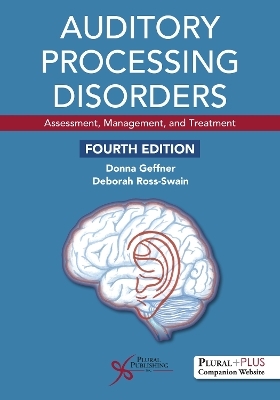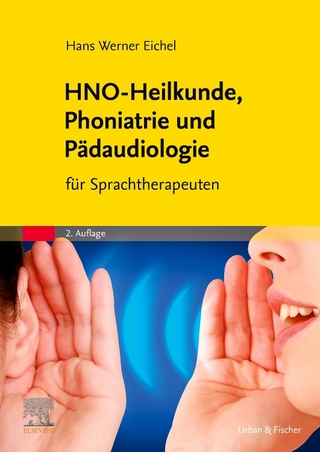
Auditory Processing Disorders
Plural Publishing Inc (Verlag)
978-1-63550-654-9 (ISBN)
With 8 new chapters and many other updates, Auditory Processing Disorders: Assessment, Management, and Treatment, Fourth Edition details the definition, behaviors, and comorbidities of auditory processing disorders (APD) while educating the reader on the most current global practices for assessment of APD, including its impact on literacy and language processing. Practical rehabilitation, management strategies, and direct evidence-based treatment programs, including the use of technology, are covered in detail. The text is a highly practical book designed specifically for practicing clinicians, instructors, and students, in both both audiology and speech-language pathology. It contains a comprehensive review of APD and is also an excellent resource for parents, teachers, and other professionals wishing to learn more about APD for themselves, their child, and their practice.
New to the Fourth Edition:
New chapters on:
the effects of COVID-19, RSV, PANDAS, autoimmune disorders and other medical issues on APD
evaluating auditory processing disorders through telepractice
the collaboration of the audiologist and speech-language pathologist in
evaluating auditory processing skills and other listening problems
treatment interventions for deficit specific processing disorders and other auditory skills
differentiation between auditory processing and listening disorders
Updated chapter on auditory neuropathy
Updated chapter on current neuroscience on the relationship between auditory processing and literacy
Description of new digital module technology for sound enhancement
Updated APPS for interventions for auditory processing disorders
Key Features:
Contributions from the field's most recognized experts, such as James W. Hall, III, Deborah Moncrief, Larry Medwetsky, John Wicker, Angela Alexander and Matt Barker
Case Studies illustrating the pansensory nature of an auditory processing disorder and the importance of multidisciplinary collaboration
Includes an integrative model for understanding auditory processing disorder utilizing research from cognitive neuroscience, neurophysiology, neurobiology, mathematics and neuroanatomy
A model of speech understanding to differentiate auditory processing disorders from non-auditory deficits and listening problems
PluralPlus Online Ancillary Materials
For instructors: Image Bank
For students and clinicians: Downloadable resources from the text
Donna Geffner, PhD, CCC-SLP/A, is a dually licensed and certified speech-language pathologist and audiologist. She served as Full Professor, Department Chair, Director of the Speech and Hearing Center, Director of the Graduate Programs and the Long Island AuD Consortium program at St. John's University prior to her retirement. She maintains a private practice in the areas of auditory processing disorders, language impairment, and AD/HD. Dr. Geffner is the recipient of the St. John's University President's Medal and many local, statewide, and national honors and awards, including ASHA's Fellow and ASHA Honors. Providence College bestowed upon her an Honorary Doctorate in Education. She currently continues to teach as an adjunct professor at Hofstra University in the AuD program. She is a former Vice President of Academic Affairs for ASHA and President of ASHA, 1999. Dr. Geffner is the author of three books (''Auditory Processing Disorders: Assessment, Management and Treatment'', with Deb Swain, now in its third edition; ''Attention Deficit Disorders: What Professionals Need to Know''; and ''The Navigator'' with Dale Seiden, a visual picture mapping for children) and two tests (''Auditory Skills Assessment'' with the late Ron Goldman and the ''Listening Inventory'' with Deb Swain). She was a host of a national television program series, produced by CBS and NBC, for which she received an Emmy nomination for Outstanding Instructional Programming. She continues to be a spokesperson and invited speaker nationally and internationally at professional conferences, television, national webinars, and local and state conferences, parent groups, and educators. **** Deborah Ross-Swain, EdD, CCC-SLP, is the clinical director and CEO of The Swain Center for Listening, Communicating and Learning. Dr. Swain is the immediate past president of the California Speech-Language-Hearing Association (CSHA) and served on the CSHA Board of Directors for 10 years. Dr. Swain is the former Chief of Speech-Language Pathology at the University of California, Davis Medical Center and held a clinical staff faculty appointment to the School of Medicine. Dr. Swain has received awards from CSHA for outstanding service and outstanding achievement and was awarded Outstanding Alumnus in 2016 from California State University, Sacramento. Dr. Swain is the author of numerous standardized tests, books, and treatment manuals, and serves on ASHA's Governmental Relations and Public Policy Board.
Foreword
Preface
Contributors
Section I. Identification, Assessment and Management
Chapter 1. Central Auditory Processing Disorders: Definition , Description , Behaviors, and. Co-morbidities
Donna Geffner
Chapter 2. An Integrative Model for Understanding Auditory, Linguistic, and Cognitive Processes in Spoken Language-Processing and Associated Listening Disorders
Larry Medwetsky
Chapter 3. Audiologic Assessment of Auditory Processing Disorders in Children and Adults
James W. Hall III and Mazen K. El-Banna
Chapter 4. Causes of Listening Difficulties in the Classroom - A Model of Speech Understanding to Differentiate Auditory Processing Disorders from Non-Auditory Deficits
Sharon Cameron and Harvey Dillon
Chapter 5. Auditory Neuropathy: auditory processing consequences and management options
Gary Rance and Julien Zanin
Chapter 6. Speech-Language Pathologist's Role in the Assessment of APD and Listening Problems
Deborah Ross-Swain
Chapter 7. Collaboration between the Audiologist and Speech-Language Pathologist for Auditory Processing Disorders and Listening Problems
Deborah Ross-Swain, John J. Wicker and Michelle D'Mello
Chapter 8. Auditory Processing and How the Brain Reads: Language, Cognition, and Temporal Processing
Martha S. Burns
Chapter 9. Neuropsychological Evaluations: Differentiating Between Auditory Processing and Related Complexities
Michelle Limon Freeman and Daniel B. Peters
Chapter 10. The Impact of Otitis Media on the Central Auditory System and Central Auditory Processing
Jack Katz, Thomas R. Zalewski and Michael J. Brenner
Chapter 11. Auditory Processing, Autoimmunity and other Medical Condition
Jeannie M. Lopez
Chapter 12. Evaluating Auditory Processing Abilities Through Telepractice
Angela Loucks Alexander and Fatima Abbas.
Section II. Management
Chapter 13. Management strategies and Sound Enhancement
Donna Geffner
Section III. Treatment and Intervention Programs
Chapter 14. Identification and Treatment of Dichotic Deficits
Deborah Moncrief
Chapter 15. Acoustic Pioneer and Auditory Processing
Matthew Barker
Chapter 16. Accessing Technology to treat auditory processing disorders: Computer-based auditory training (CBAT)
Jeanane M. Ferre and Courtney Baker
Chapter 17. Applicable Applications: Treatment and Technology with Practical, Efficient, and Affordable Solutions
Bunnie Schuler
Chapter 18. Resources and Websites
Lindsay Lerro
Appendix A. Auditory Processing Disorder: Tips for Parents
Donna Geffner and Deborah Ross-Swain
Appendix B. Auditory Processing Disorder: Tips for Teachers
Donna Geffner and Deborah Ross-Swain
Index
| Erscheinungsdatum | 26.08.2024 |
|---|---|
| Verlagsort | San Diego |
| Sprache | englisch |
| Maße | 178 x 254 mm |
| Themenwelt | Medizin / Pharmazie ► Gesundheitsfachberufe ► Logopädie |
| ISBN-10 | 1-63550-654-9 / 1635506549 |
| ISBN-13 | 978-1-63550-654-9 / 9781635506549 |
| Zustand | Neuware |
| Haben Sie eine Frage zum Produkt? |
aus dem Bereich


